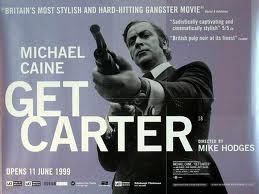by Yayaati Joshi
[box]Yayaati Joshi tells us of a British revenge story that could be considered a trend-setter for many crime stories to follow. Get Carter by Mike Hodge and starring Michael Caine, is absolutely worth your movie dollars, says Joshi.[/box]On the face of it, Mike Hodge’s film Get Carter is a film about revenge. But scratch the surface, and you will see more: style, passion, grit, and wonderfully shot scenes which make even violence appear gleeful. The film’s premise is this: a gangster wouldn’t stop unless he finds out how and why his brother was killed. Leave that to the skilled Michal Caine, last seen in The Dark Knight Rises, and he will bring out a character more passionate than Bond, more determined than Bourne, and angrier than the father in Taken.
 Caine must dodge a few people in his quest to find out the truth, and kill a few others to seek retribution. This might make him look like a man on a mission, but Caine ensures that he has his fun alongside. The Brits like their men in a certain way—with passion, even when they are tackling difficult situations. In a very Bond-like manner (just minus his suave talking), Caine, or Carter, as he is known in the film, is disturbed by his boss’s henchmen while making love to a small hotel’s owner. He is startled, but not perturbed. Slowly, he picks up his gun, and walks the henchman out of the room, into the street, while being completely undressed himself. If guns were meant to be phallic symbols, then Caine brings the gun to life with his full monty walk.
Caine must dodge a few people in his quest to find out the truth, and kill a few others to seek retribution. This might make him look like a man on a mission, but Caine ensures that he has his fun alongside. The Brits like their men in a certain way—with passion, even when they are tackling difficult situations. In a very Bond-like manner (just minus his suave talking), Caine, or Carter, as he is known in the film, is disturbed by his boss’s henchmen while making love to a small hotel’s owner. He is startled, but not perturbed. Slowly, he picks up his gun, and walks the henchman out of the room, into the street, while being completely undressed himself. If guns were meant to be phallic symbols, then Caine brings the gun to life with his full monty walk.
At some point in the film, Carter seems to be less concerned about the revenge, and more about him having it his way. His moments of passion are plenty, and in one beautifully-shot scene in which love-making has been juxtaposed with movements of a running vehicle, Carter seems to enjoy these diversions more than the actual, self-allotted task. Convenient it might be to write him off as a reckless reprobate, or an overweening man with a gun, but one has to take into account that Carter’s mission is a lost cause. An eye for an eye does leave the whole world blind, and perhaps Carter is compensating himself for his moments of imminent blindness by enjoying everything that comes his way. Thus, his most intriguing feature is also a crippling handicap since Carter never rises above the common adultery of a philanderer, and makes us wonder if the turn of events would have been different had he not worn his genitals on his sleeve.
But amidst all this, Hodge’s leitmotif of revenge and escape (Carter’s plan is to escape to South America eventually), is never undermined. With each passing second, the protagonist moves closer to his objective. He can’t bring his brother back to life; but he can definitely send the perpetrators to their graves. All this, with the inscrutable composure of Caine’s face, and matter-of-fact ease in dealing with informers, forms a fine movie, one that is considered by many to be the best (British) crime film, one that formed the base for many other crime films to follow (Guy Ritchie is said to be inspired by the film). The other self-serving result of this film is that despite being neither heroic, nor lovable, Carter is deemed to be both, and in his final moments, one feels for him as he chases his brother’s killer. Puffing and panting, he makes the killer drink a bottle of whiskey—revenge exacted in a symbolic manner, as Carter’s brother was reportedly forced to consume alcohol in order to disguise his death as a suicide/accident.
A lot more than just a crime film, to place it on the shelf next to Scarface would be wrong. For one thing, Get Carter’s enjoyable slowness is no match to the fast-paced story of the immigrant upstart. For another, the coda of both the films is different—Scarface tries to teach a moral lesson, by showing its protagonist’s downfall, Get Carter retains the mystery around Carter, and somewhat like his brother, even Carter dies a damp death, and doesn’t get everyone’s sympathy.
Film Freak is an exclusive monthly column by Yayaati Joshi, who, well, is a film freak. It features movie reviews and essays on various aspects of Indian and world cinema.
Yayaati Joshi is a man with simple tastes and intense beliefs. Contrary to the bling associated with the capital city, he prefers the company of close friends, an engaging book or an Alfred Hitchcock movie. His placid demeanour is often mistaken for reticence; Yayaati is a self- proclaimed loner, whose recent pursuits include his foray as a budding writer. Yayaati blogs at http://rantingsofadelusionalmind.wordpress.com
[facebook]Share[/facebook] [retweet]Tweet[/retweet]






[…] edited version of the article can be read here] Share this:FacebookTwitterLinkedInGoogle +1EmailRedditLike this:LikeBe the first to like this. […]